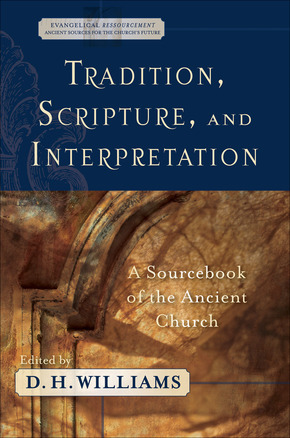D.H. Williams: Tradition, Scripture, and Interpretation
 D.H. Williams, Tradition, Scripture, and Interpretation: A Sourcebook of the Ancient Church (Grand Rapids: Baker Academic, 2006), 189 pages.
D.H. Williams, Tradition, Scripture, and Interpretation: A Sourcebook of the Ancient Church (Grand Rapids: Baker Academic, 2006), 189 pages.
D. H. Williams (PhD, University of Toronto) is professor of religion in patristics and historical theology at Baylor University. He is the author of Evangelicals and Tradition and Retrieving the Tradition and Renewing Evangelicalism and editor of The Free Church and the Early Church. Tradition, Scripture, and Interpretation is the second volume in the Evangelical Ressourcement series, which is grounded in the belief that there is a wealth of theological, exegetical, and spiritual resources from the patristic era that is relevant for the Christian church today, as well as the church of the future. This series aims to help church thinkers and leaders reappropriate ancient understandings of Christian belief, amid the current resurgence in interest in the early church, and apply these ancient understandings to ministerial foci in the twenty-first century. Readers of the series will see how Scripture and the early tradition were both necessary in the formulation of orthodoxy, that there is a reciprocal relationship between the life of the church and theology, and that the liberty of the Spirit in contemporary believers must be balanced by a continuity with church tradition. If these three things are done, it seems, the Protestant church could truly be considered the church catholic (i.e., universal).
In keeping with the dictum of Wesley that ‘true, genuine Christianity [directs] us to the strongest evidence of the Christian doctrine’, this sourcebook gathers key writings from the first through sixth centuries on various topics of concern to the church that illustrate the ways in which its confessions and worship were expressed during that time. The writings are arranged thematically into nine areas, including the rule of faith, baptismal formulations and instruction, creeds, and biblical interpretation. Within each theme, the writings are arranged chronologically, which reveals how the Christian tradition has developed over time. Explanatory notes by Williams provide historical background and theological context for each reading. In what follows, I shall point out some prominent points from Williams’ text.
Williams opens the proverbial anthology with an expansive introduction, entitled ‘Origins of Christian Tradition’, that examines the close interplay between Scripture and tradition in the thinking of the early church. He asserts that the early fathers would have known nothing of the contention of sola scriptura, as it was incomprehensible to isolate the bible from the tradition of the church (he recognizes that the bible is foremost a book of the church, for what the church believed was ‘canonical’ before the bible was codified). This integral association of the bible and church tradition need not be understood as a squelching of the Spirit, however, for the Spirit is present throughout both the bible and church tradition, Williams notes (18). It could be said, then, that the bible (revelation) and tradition are two sides of the same coin. Indeed, there is a co-inherence in this symbiotic (reciprocal) relationship. Scripture could be portrayed as the anchor, whereas tradition is the interpreter (cf. 27).
Category: In Depth, Summer 2017


